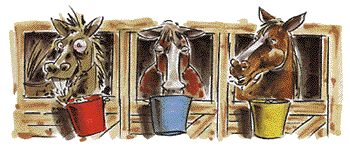|
certain foods individually as a result of certain allergies or enzyme reactions
and horses are the same way. This is why you should be skeptical of any blanket
statement involving feeds or ingredients when it comes to behavioral effects.
 If fed excessive amounts of grain no matter what type there are individual
horses that may get hyperactive. Although this doesn’t mean that every horse
should never be fed grain again. You simply need to find different feed
ingredients that won’t affect the particular horse with adverse reactions. If fed excessive amounts of grain no matter what type there are individual
horses that may get hyperactive. Although this doesn’t mean that every horse
should never be fed grain again. You simply need to find different feed
ingredients that won’t affect the particular horse with adverse reactions.
Attitude
is often also affected by environmental stresses. A horse with a bad attitude is
often the result of a reaction rather than a personality trait. The horse’s
daily routine is full of several areas where a horse can react adversely such as
a training situation, a management situation, a physical problem, an equine
social problem or other disagreeable factors.
Illness often affects behavior. A horse may display depression, lethargy or
crankiness if they are ill, developing an ailment or in chronic pain. If a
feeding program of nutritional additives are given in an attempt to make up for
a deficiency in training or handling they will not work.
It is important that owners stick to the basics when dealing with horses. When
having trouble with a horse’s attitude the first thing to do is go back to the
basics of equine behavior to try and determine what is causing the adverse
reaction. However, this doesn’t mean the feeding program isn’t the cause for any
behavior problem in horses. Rather humans are too quick to place blame for a
horse’s bad behavior on feeding programs when it may be something else entirely.
If you find that your horse’s diet is the result of their bad attitude then
there are several areas where you can start to correct the problem. When
managing the behavior of a horse through their diet the most important thing to
remember is to match the feeding program with a horses activity needs. The
overfeeding of energy is the most common mistake that leads to hyperactive
horses. The reason for this mistake is because many horse owners do not
understand where energy comes from in a horses diet so they are not aware when
they are giving their horse too much energy for their activity level. Horses
will react in two ways when they have too much energy in their diet. They will
either become fat and there won’t be much difference in their attitude or
behavior, or the horse will become hyperactive and burn off the extra energy
through nervous behavior.
So how exactly do you increase the energy intake of a horse that is hyperactive
after being fed high levels of grain? You should give the horse a diet that is
high in fat or oil. Increased amounts of grain can lead to some horses becoming
hyperactive because they are able to quickly digest and absorb the starch in the
grain which causes a responding “spike” in their glucose and hormone levels that
cause them to become over-sensitive.
Since a horses body can’t determine where a calorie comes from it users some as
activity sources while other it uses for growth or fat deposits. Whether the
calories come from corn or oats the cells in the horse’s body use them
indiscriminately. The main goal of horse owners is to have an animal that looks
sleek, glossy and well padded with fat so that the horse looks in good health
with good care. This is often the issues since an animal needs an abundance of
calories in their diet to get fat. A horse can look healthy by consuming a diet
containing fat rather than a diet of grain which is associated with
hyperactivity.
You should decrease the amount of grain and starch in a horse’s diet as you
increase the level of fat which can be up to one and a half to two pounds per
day. The horse can get an adequate amount of energy to meet their activity level
when you increase the level of fat content and decrease the amount of grain or
starch that is in the horse’s diet. However, you avoid the “spikes” in the
horses metabolic hormone levels because you are not feeding as much starch and
as a result you can avoid the mood swings in the horse’s behavior and attitude.
A horse’s behavior can also be affected by nutrients such as vitamins, minerals
or amino acids as a result of their specific roles in metabolism. When deficient
in certain vitamins and minerals some horses can become hyperactive. However,
other horses may have a decrease in activity when they are missing the exact
same nutrients.
|